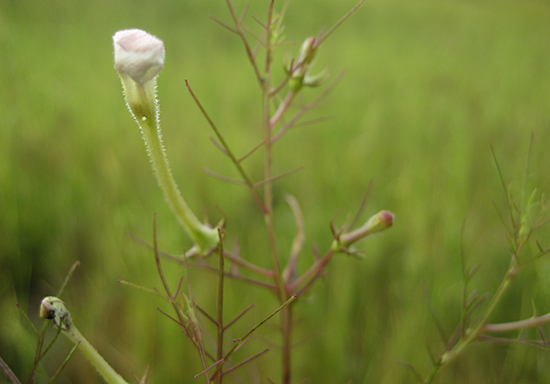Wageningen, The Netherlands
September 25, 2014
By Wageningen University, Centre for Crop Systems Analysis

Few agronomists are familiar with Rhamphicarpa fistulosa, a fragile weed with white flowers, from the broomrape family. Yet this root parasite is increasingly affecting rice cultivation in Africa. This has become clear from the initial results of the research programme PARASITE on parasitic weeds in rice in sub-Saharan Africa.
The rice pest was described by the Beninese agronomist Gualbert Gbèhounou in the early 1990s. More than twenty years later, still very few people are familiar with it. This was the motivation for seven Dutch and African research groups, led by Wageningen UR, to start investigating the problem in 2012.
Rhamphicarpa is easily overlooked at first
The Dutchman Jonne Rodenburg has been investigating the plant since 2006. He is a weed expert at the CGIAR institute AfricaRice in Tanzania, one of the seven research partners of the PARASITE programme. “Women farmers showed us the plant during field visits in Senegal and Benin,” he recalls. “In both locations, they had no idea what to do about it” Agricultural extension officers to whom Jonne spoke also didn’t know the plant. And he understands why: Rhamphicarpa is easily overlooked before it overgrows a rice field as it is a fragile plant with thin, needle-like leaves and its flowers only open at night.

Twenty per cent less yield
The partners in PARASITE organised workshops, interviewed farmers and other stakeholders like extension and crop protection officers, consulted herbaria and studied the relevant biology. The studies showed that Rhamphicarpa occurs in almost all countries south of the Sahara. It is increasingly prevalent in the low-lying, rain-dependent rice fields where rice cultivation is expanding rapidly. The parasite can easily reduce yields by as much as twenty per cent and even cause complete crop failure. In fields at higher altitudes, rice cultivation is more susceptible to Striga, the other major rice parasite.
Field trials
Wageningen UR, AfricaRice and the Tanzanian agricultural institute MARI have now started field trials. Along with farmers and extension agents, scientists examined the effect of organic and chemical fertilisers, and combinations of the two. Fertilisation is important because it reduces the parasite infection and the parasite may cause less of an effect as well-fed plants may be more resilient. The partners are also looking into whether other varieties or seeding intervals could suppress the pest. “Pesticides are often unavailable or too expensive,” project leader Lammert Bastiaans of Wageningen UR explains. “Besides, the technology is very knowledge intensive and therefore not very suitable for promotion among farmer communities with high literacy rates”
Still too little attention to Rhamphicarpa
The lack of awareness of Rhamphicarpa appears to be due to a variety of reasons. African governmental crop protection services focus less on weeds than, for example, locust plagues or fungal diseases, as the latter cause more visible losses in yield. In addition, field visits by extensions agents are scarce due to limited financial support. The extension agents often even lack funds to purchase petrol for their motorcycles, while rice fields may be quite remote.
Socioeconomic conditions
The research programme PARASITE is funded by the Dutch organisation NWO-WOTRO and runs until 2016. The partners will make educational material on Rhamphicarpa and encourage farmers to start their own tests. Jonne Rodenburg praises the interdisciplinary approach. “We also look at the socioeconomic conditions, consider which approach is best for the farmers’ needs and examine how the information can best be disseminated.”
Literature
- Rodenburg J, Morawetz JJ & Bastiaans L, 2015. Rhamphicarpa fistulosa (Hochst.) Benth. – A widespread facultative hemi-parasitic weed, threatening rice production in Africa. Weed Research 55, in press
(This article shows – on the basis of a combined literature and herbarium study - the major threat R. fistulosa presents to rain-dependent rice cultivation in large parts of Africa.)
- Kabiri S, Rodenburg J, Kayeke J, van Ast A, Makokha DW, Msangi SH, Irakiza R & Bastiaans L, 2015. Can the parasitic weeds Striga asiatica and Rhamphicarpa fistulosa co-occur in rain-fed rice? Weed Research 55, in press.
(This article shows that the parasitic weeds R. fistulosa and S. asiatica occupy a complimentary niche in the upland-lowland continuum of rain-dependent rice cultivation.)
Meer informatie